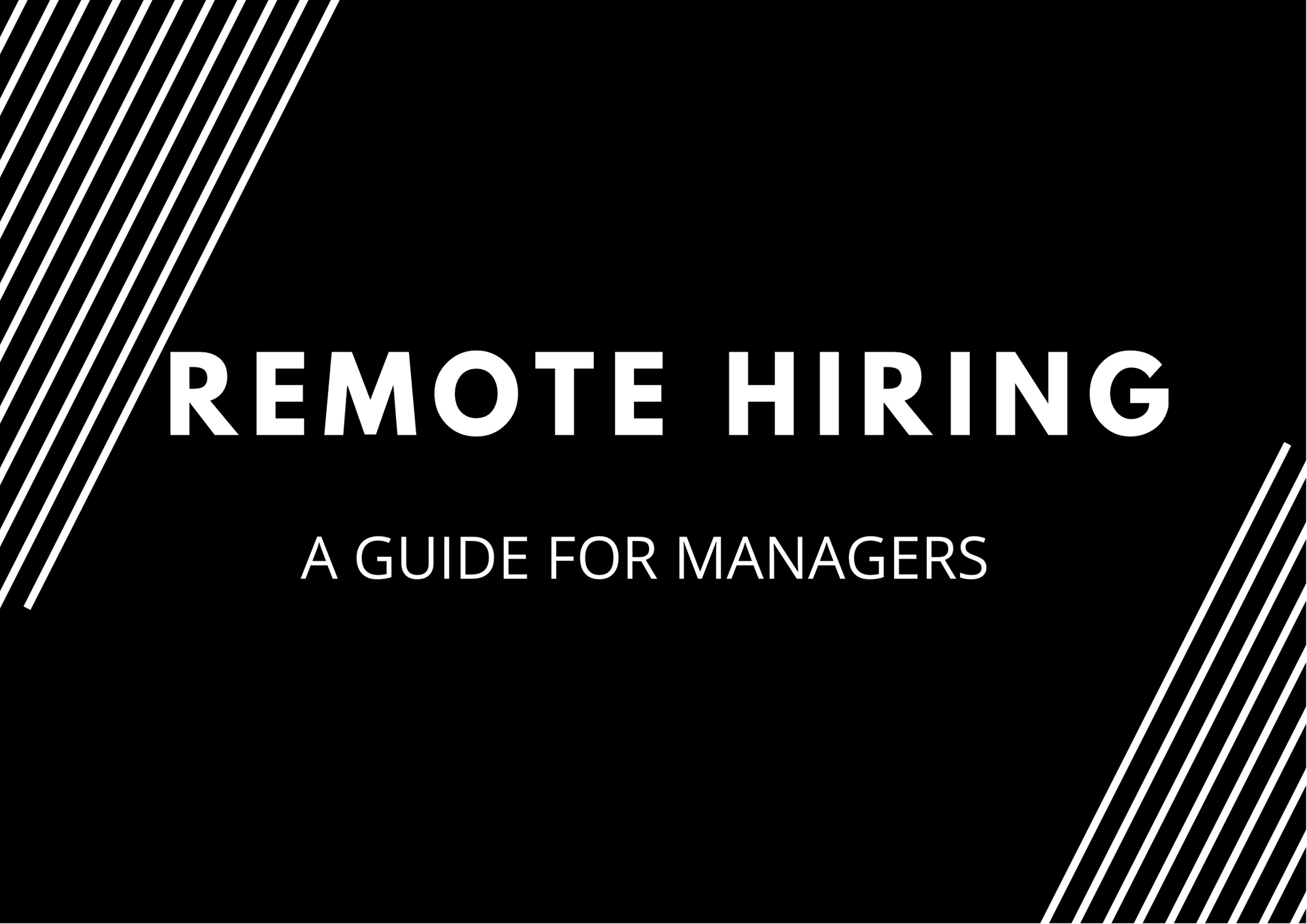10 Remote Hiring Tips Every Manager Needs To Know
One thing is for sure, the effects of the pandemic are not going away anytime soon. For a long time, we'll have to live and work with them. To learn more about remote hiring tips every manager needs to know.

One thing is for sure, the effects of the pandemic are not going away anytime soon. For a long time, we'll have to live and work with them. This period has changed everything, from health difficulties to the need for lockdowns and social distance. It can also fundamentally alter how we handle employment and hiring.
Although the pandemic is far from over, businesses still need to function and hire. They may require urgent personnel right away, or they may need to employ them so new hires may be trained, prepped, and integrated into operations when business resumes.
Building a fully functional workforce may be a faraway dream for small business owners, with the cost of employing a new full-time employee still blazing high at $4,129. However, this is where hiring remote workers comes into play. Their hourly contracts and lack of a full-time commitment allow you to upscale and downscale your workforce as needed while saving money on employee benefits.

But How Do I Hire Someone I've Never Met Before?
Hiring qualified individuals at the right moment accounts for a significant amount of a company's success. Remote recruiting has slowly become the new normal, but finding high-quality candidates and virtually onboarding them may be difficult. Hiring can be stressful enough in person and even more so in a remote hiring situation. Letting your employees undergo recruitment training can be helpful to equip them with new skills needed for these new changes. If you want to hire virtual assistant for your company, use these hiring tips to get the best global talent available.
1. Understand What You're Looking For
In general, if you do not understand what you are seeking in life, you will never find it. If you are a remote job recruiter, the same applies. It will be constructive if you have a clear vision of what you want in your remote employees. Hiring is not a "one-size-fits-all" option, and it should be thoroughly thought out before proceeding. Writing a detailed job description also helps in hiring the right candidate.
2. Request a Statement of Purpose or a Video Recording to Evaluate Your Candidates
You will undoubtedly receive more applications than you can look through after posting a job application. As a result, it's critical to determine which prospects are qualified for an interview in the first place. One of the most straightforward solutions to this is to ask for a video introduction in which a few important details are mentioned. That will narrow down the serious applicants and provide you with additional resources to help you make a selection.
3. When interviewing, read between the lines
When filtering through job applications, you may want to start with an applicant's experience. However, you should also examine their previous job experience and soft skills. If the potential remote hire is continuously switching jobs, their company loyalty and work ethic may be a problem.
Long-term job experience on a resume typically indicates that the applicant has been a continuous supplier of solid work for a company. In addition to the skills and expertise, it is critical to assess their soft skills and how they will fit into your business culture.
4. Prepare For The Interview
If more than one person will do the interviews during the remote recruiting process, make sure you have a standard list of interview questions for remote workers. For example, is the interview centered on managerial style? Past experiences? How good are they as project managers?
Create interview kits to assist everyone who conducts a remote hiring interview at your organization in preparing and documenting their replies so you can make the best, most educated decision. It also allows you to guarantee that there are no repeated questions throughout the interviews to save both your and the candidate's time.
5. Implement Collaborative Hiring
As we mentioned in our previous point, collaborative hiring is an excellent approach to incorporate your whole team in the recruiting process, remote and otherwise. This will help you better evaluate a candidate's abilities, personality, and experience. So, it is worthwhile to include your team sooner in the process of hiring remote employees.
During the recruiting process, future coworkers will have the chance to examine, evaluate, and get to know their potential colleagues. That will assist you in analyzing if the remote recruit is a good fit for your team.
6. Eliminate Any Technical Difficulties
Before you schedule the interview, make sure that all of your technical equipment is in working order, and ask your applicant to do the same. Remember that just as you evaluate the prospect, they too will assess the firm depending on you. Having technical issues or failing to get your equipment set up and tested before the interview demonstrates a lack of attention and organization on the employer's side.
7. Assign a Minor Task
Assigning a task is an effective way to get a good sense of your potential employees as people and as remote workers. Ask them to come prepared with a small task before scheduling a video call with them for an interview. This may be as basic as taking personality tests such as the Enneagram test from BrainManager or any other career-related task that provides more in-depth information about their character and work.
8. State Your Expectations
One of the most crucial stages after hiring remote workers is establishing clear standards and expectations. Expectations must be quite explicit and even better if written down so that there is no later misunderstanding. This should include everything from working hours, routine procedures, and response times to corporate culture.
9. Take Them Through a Typical Work Day
Another critical aspect to discuss is what exactly their regular workday will look like. Take the potential candidates through their duties, responsibilities, the various departments they will be working with, how long they have to deliver projects, whether they are expected to perform under pressure, etc.
Note how interested they seem during this process and whether they ask any follow-up questions. You want your employees to be interested in the work they do to produce the best results, and a candidate who has doubts and asks questions about the role is always a positive sign.
10. Allow for a Transition Period
Because the in-person element is missing, transitioning to a remote setting can be a challenging adjustment. Although it is difficult, it is critical to remember to establish a connection with your new colleagues. Finding a way to link a new hire's objectives with the company's goals will result in a win-win situation for everyone concerned.
Each person is driven differently, and it is critical to identify this early on. Building a firm foundation begins with good communication and getting to know your staff, both crucial for success.

"Remote work is the future of work." — Alexis Ohanian, Reddit.
With even some of the biggest companies globally, like Walmart and Apple moving towards a remote or at least hybrid work module, there are many benefits of remote hiring for smaller businesses. However, with the potential that remote work holds, managers and entrepreneurs need to adapt to a remote hiring process, and we hope that these hiring tips and tricks help you with hiring the right people for the job.
If, however, you want to skip reading through countless resumes and sitting through hours of interviews, delegate the hiring process to us at Wishup. We have a rigorous filtering process and guarantee you a virtual assistant hand-picked from the top 2% of global talent.
If you want to hire a virtual assistant from Wishup, click here or drop us an email at [email protected].
